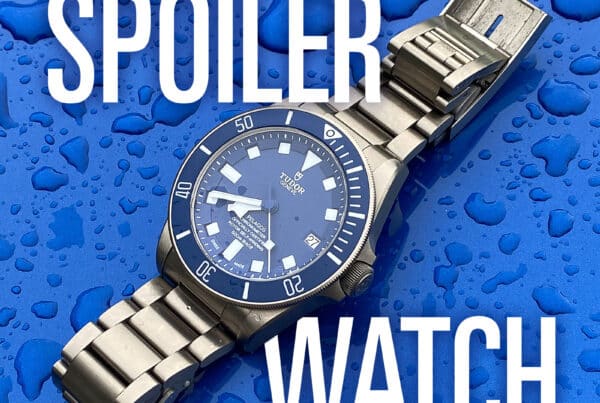I have heard it so many times now that it almost seems like a cliche. When a watch collector talks about buying an expensive watch, he often claims that he will pass the heirloom to his children. Watch advertisers try to reinforce this notion too, but I am calling this a psychological manipulation. This article explores if that is a reality or a pipe dream based on changing values. In the end, I will attempt to answer whether your children really want your crusty old watch or if it is destined for the pawn shop or worse… a trash can? I am not talking about ultra-expensive, investment grade commodity watches. I doubt anyone is going to dump those in the trash.
Like many watch nerds, I am opinionated in the subject of the greater meaning of watches. Just because I write it, does not mean that it is the gospel for those reading it. There are exceptions to every rule and anecdotal evidence for both sides of an argument. Hopefully, nobody will get offended because that is not what I am trying to do.
 Here’s a scenario. A man wants a fancy watch and tries to justify his sizeable investment to his wife (or the frugal side of himself) and says something like “this will be my one watch and I want to pass it on to our kid”. While that sentiment is romantic, let’s look at the facts. In this case, I will use a man as an example because this phenomenon seems to be a male-dominated practice. However, it is possible that someone’s Mom out there is having the same thoughts…
Here’s a scenario. A man wants a fancy watch and tries to justify his sizeable investment to his wife (or the frugal side of himself) and says something like “this will be my one watch and I want to pass it on to our kid”. While that sentiment is romantic, let’s look at the facts. In this case, I will use a man as an example because this phenomenon seems to be a male-dominated practice. However, it is possible that someone’s Mom out there is having the same thoughts…
Things Aren’t Like They Used to Be
It used to be that a man bought a watch and wore it for a long period of his life. This one watch was a tool to tell the time and ruled the aspects of his day-to-day activities. This essential item could make the difference between getting to work on time and being late. It seems that almost everybody had a watch “back in the day” before cell phones and other personal devices like fitness trackers became the “new normal”.
Nowadays, I see more naked wrists or people wearing digital or app-based smartwatches than ever before. Less often do I see anyone wearing an actual watch. And even less often do I see a watch of high quality that would be considered collectible.
How Smartwatches Have Changed the Concept of the Heirloom Watch

Mechanical watch versus Smartwatch
Smart Watches Are Made to Be Disposable
Remember a few years ago when the Apple Watch was launched? These little wrist computers sold like hotcakes and became a common replacement for watches. At that time, many people had abandoned wearing a watch completely because their mobile phones had a clock in them that was atomic-accurate. They did not need or want a watch because the function of it was redundant. Maybe they thought it was too old school and they did not want to be like the Gen-Xers.
Apple laughably made a gold version of the Apple Watch, which was ridiculous. Precious metal was going to be used on a device that is designed to be obsolete in less than 2 years. I wonder how many of those they sold. I suppose that there is a Shiek that has one sitting in a closet right now collecting dust. My point is a watch that is so closely tied to operating systems and technology that changes every year will become defunct and therefore it will never be an heirloom, even if made in gold. In 10 years time, it is likely the device won’t even work on the newer networks.
Smart Watches Might Be More Enticing to Younger People
You might be wondering why I am talking about smartwatches right now. It’s because the appeal of these devices to younger generations may be stronger than the appeal of a mechanical watch that only tells the time (and maybe has an additional complication like a chronograph). Smartwatches run software so potentially thousands of applications can be customized for the user. Smartwatches can stay trendy, no matter what social media platform is the most popular. They can do things that regular watches cannot like make a call, take a picture and so on. A mechanical watch is stuck in a period where those choices were not even possible yet, somewhere in the 20th century.
Now imagine asking someone who is accustomed to wearing no watch or a smartwatch to wear a mechanical watch that is less accurate, does only one thing and you will start to see that the intended recipient of your watch may have very little interest in wearing it. What we as collectors might value or cherish might mean very little to a younger person who has no interest in the past, history or being left out of the technological loop. A similar situation happens when older people insist that their children take their furniture even if the children do not care for the style or need it. It simply becomes a hassle and not an asset.
The Kids Can’t Tell Time?
 This is going to sound insane, but there are stories of children, teenagers and even college-aged kids who cannot easily read the analog dials of traditional clocks. It appears that many of them grew up reading the digital clocks and schools are not teaching how to read the old round clocks. This also applies to cursive writing, which can be undecipherable to so younger people. This makes old analog wristwatches less useful for the younger generation who might inherit the watch. Why wear it if you cannot read it, right?
This is going to sound insane, but there are stories of children, teenagers and even college-aged kids who cannot easily read the analog dials of traditional clocks. It appears that many of them grew up reading the digital clocks and schools are not teaching how to read the old round clocks. This also applies to cursive writing, which can be undecipherable to so younger people. This makes old analog wristwatches less useful for the younger generation who might inherit the watch. Why wear it if you cannot read it, right?
Parental Tastes Do Not Always Transfer
Now that my dear old mother has passed, I can share a story of a birthday present that I received from her that was not appreciated at the time. My mother was famous for giving presents that she liked, and not necessarily presents that were suited to the recipient. I remember getting the girliest tape dispenser made from plastic sunflowers one year and my brother, who was into Pink Floyd and KISS received a Bee Gees album. I almost fell on the floor laughing when he opened it, but my brother did not laugh.
Clearly, there was a disconnect of what between the tastes of individuals and just because the parent likes it, the child may not. Well-meaning tokens of love are not always well received if they come out of left field. I’ll admit that that tape dispenser got “lost” in a move and I regret not having it now… but that is a different story. Many of us put great value on items owned by our parents, but we might not realize it until later.

The Hassle of a Mechanical Present
The types of watches that people might pass down tend to be mechanical in nature, and perhaps valuable. If a watch is old, it might need maintenance or a repair to be deemed wearable. A recipient might not want to invest the money to get the watch fixed. It could cost a few hundred dollars or much more to fix a watch. It might become impossible to fix older watches because the parts stockpiles ran out a long time ago. And, it is getting more difficult to find watchmakers, who seem to be in a dying industry. All these factors combine to make owning an inherited mechanical watch a pain for those without interest in investing in the watch.
To prove the point, I’ll share a true story. I was literally given an old watch that was going to be tossed in the garbage. The watch was broken and the children did not want to bother with it. The watch turned out to be a very interesting Baume & Mercier chronograph owned by a naval aviator dated to the late 1940s to early 1950s. This watch was worth saving, but not to the ones who inherited it. It was just an object with no value to them.
There are Hopefully Exceptions to the Rule
Some people reading my thoughts might think that I am completely off base. They might be thinking that I have misrepresented the younger generation’s lack of interest in their father’s wristwatch. That is not my intent. I would love to be proven wrong, and I hope that there are people out there who would love to have a parent’s watch and cherish it as a family heirloom. That would be wonderful. I have watches from both of my parents, and I will never part with them.
But things are changing quickly. Watch collectors cannot assume that the watch bought today, will be cherished by their child many years from now. Nobody can predict what the future holds, but the tradition of passing down a watch may be a romantic notion that belong to our parents’ generation. You will have to make the call to bequeath your precious watch to your child, or it might be better in the hands of another collector who knows the horological, historical worth of the wristwatch. I have only brushed the tip of the iceberg on this subject, but it might be enough to sink your future plans of passing your watch to your child. Only you can make that call on an individual basis.




